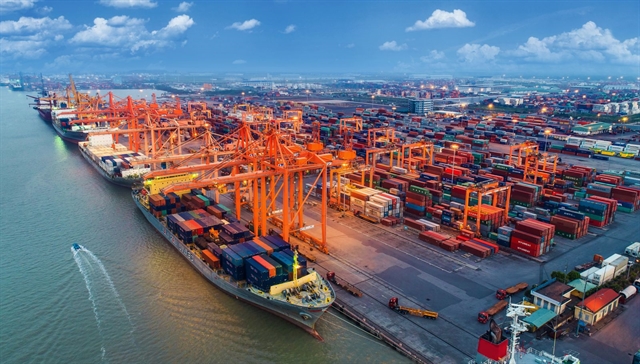 Economy
Economy


|
| Hải Phòng Port. Việt Nam is developing a seaport master plan for the 2021-30 period. — Photo enternews.vn |
HÀ NỘI — Việt Nam will develop a seaport master plan for 2021-30, with an aim to enhance infrastructure connectivity, reduce logistics costs and promote marine economic development.
Deputy Prime Minister Trịnh Đình Dũng early this week approved the development of the seaport master plan, which is part of efforts to implement the strategy for the sustainable development of Việt Nam’s marine economy to 2030.
The plan would include solutions to improve the efficiency of investment in developing seaports in Việt Nam and ensure synchronous development between seaports and other transport infrastructure.
The seaport master plan must also help improve regional linkage to enhance investment efficiency and reduce logistics costs, Dũng asked.
He also asked the plan to be made based on the current natural condition, resources and existing seaports, as well as forecast transportation demand with regard to climate change.
The impacts of science and technology on seaport development must also be taken into account.
Most importantly, seaport development planning must be based on the evaluation of the connectivity of seaports throughout the country, with seaports in other countries, with other transport infrastructure (road, railway, airport and in-land waterway system), with urban areas, economic zones, tourism zones, industrial zones and logistics centre.
Ensuring connectivity was of critical importance, Dũng stressed.
Dũng asked that the seaport development must take environmental protection into account.
Focus must be placed on developing seaports which played important roles in promoting the country’s socio-economic development.
Nguyễn Văn Bình, Head of the Party Central Committee's Economic Commission, recently said that Việt Nam did not need too many seaports. Instead, it was necessary to optimise the seaport system efficiency and improve connectivity with the transport system, he said.
Logistics costs in Việt Nam accounted for nearly 21 per cent of the country’s gross domestic product, according to statistics by the World Bank in early 2019.
According to the Việt Nam Marine Administration, Việt Nam now has 44 seaports. VNS




